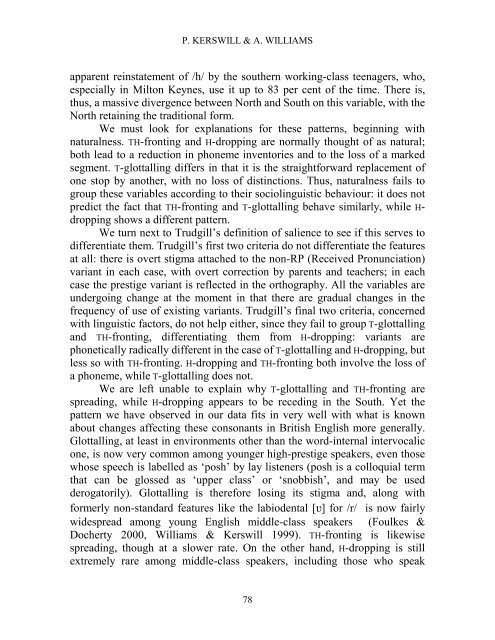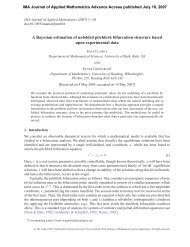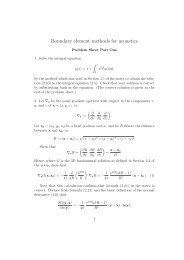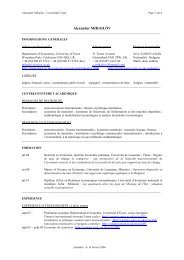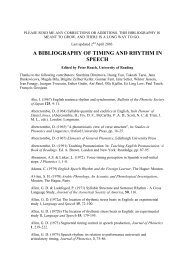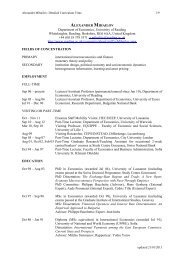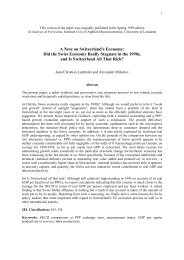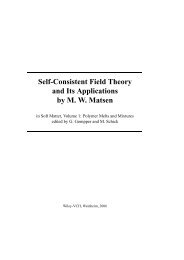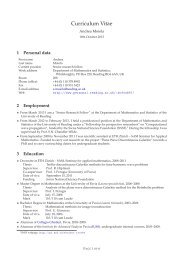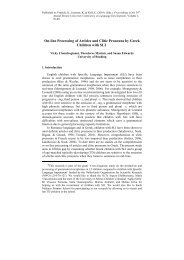Reading Working Papers in Linguistics 4 (2000) - The University of ...
Reading Working Papers in Linguistics 4 (2000) - The University of ...
Reading Working Papers in Linguistics 4 (2000) - The University of ...
You also want an ePaper? Increase the reach of your titles
YUMPU automatically turns print PDFs into web optimized ePapers that Google loves.
P. KERSWILL & A. WILLIAMS<br />
apparent re<strong>in</strong>statement <strong>of</strong> /h/ by the southern work<strong>in</strong>g-class teenagers, who,<br />
especially <strong>in</strong> Milton Keynes, use it up to 83 per cent <strong>of</strong> the time. <strong>The</strong>re is,<br />
thus, a massive divergence between North and South on this variable, with the<br />
North reta<strong>in</strong><strong>in</strong>g the traditional form.<br />
We must look for explanations for these patterns, beg<strong>in</strong>n<strong>in</strong>g with<br />
naturalness. TH-front<strong>in</strong>g and H-dropp<strong>in</strong>g are normally thought <strong>of</strong> as natural;<br />
both lead to a reduction <strong>in</strong> phoneme <strong>in</strong>ventories and to the loss <strong>of</strong> a marked<br />
segment. T-glottall<strong>in</strong>g differs <strong>in</strong> that it is the straightforward replacement <strong>of</strong><br />
one stop by another, with no loss <strong>of</strong> dist<strong>in</strong>ctions. Thus, naturalness fails to<br />
group these variables accord<strong>in</strong>g to their sociol<strong>in</strong>guistic behaviour: it does not<br />
predict the fact that TH-front<strong>in</strong>g and T-glottall<strong>in</strong>g behave similarly, while H-<br />
dropp<strong>in</strong>g shows a different pattern.<br />
We turn next to Trudgill’s def<strong>in</strong>ition <strong>of</strong> salience to see if this serves to<br />
differentiate them. Trudgill’s first two criteria do not differentiate the features<br />
at all: there is overt stigma attached to the non-RP (Received Pronunciation)<br />
variant <strong>in</strong> each case, with overt correction by parents and teachers; <strong>in</strong> each<br />
case the prestige variant is reflected <strong>in</strong> the orthography. All the variables are<br />
undergo<strong>in</strong>g change at the moment <strong>in</strong> that there are gradual changes <strong>in</strong> the<br />
frequency <strong>of</strong> use <strong>of</strong> exist<strong>in</strong>g variants. Trudgill’s f<strong>in</strong>al two criteria, concerned<br />
with l<strong>in</strong>guistic factors, do not help either, s<strong>in</strong>ce they fail to group T-glottall<strong>in</strong>g<br />
and TH-front<strong>in</strong>g, differentiat<strong>in</strong>g them from H-dropp<strong>in</strong>g: variants are<br />
phonetically radically different <strong>in</strong> the case <strong>of</strong> T-glottall<strong>in</strong>g and H-dropp<strong>in</strong>g, but<br />
less so with TH-front<strong>in</strong>g. H-dropp<strong>in</strong>g and TH-front<strong>in</strong>g both <strong>in</strong>volve the loss <strong>of</strong><br />
a phoneme, while T-glottall<strong>in</strong>g does not.<br />
We are left unable to expla<strong>in</strong> why T-glottall<strong>in</strong>g and TH-front<strong>in</strong>g are<br />
spread<strong>in</strong>g, while H-dropp<strong>in</strong>g appears to be reced<strong>in</strong>g <strong>in</strong> the South. Yet the<br />
pattern we have observed <strong>in</strong> our data fits <strong>in</strong> very well with what is known<br />
about changes affect<strong>in</strong>g these consonants <strong>in</strong> British English more generally.<br />
Glottall<strong>in</strong>g, at least <strong>in</strong> environments other than the word-<strong>in</strong>ternal <strong>in</strong>tervocalic<br />
one, is now very common among younger high-prestige speakers, even those<br />
whose speech is labelled as ‘posh’ by lay listeners (posh is a colloquial term<br />
that can be glossed as ‘upper class’ or ‘snobbish’, and may be used<br />
derogatorily). Glottall<strong>in</strong>g is therefore los<strong>in</strong>g its stigma and, along with<br />
formerly non-standard features like the labiodental [K] for /r/ is now fairly<br />
widespread among young English middle-class speakers (Foulkes &<br />
Docherty <strong>2000</strong>, Williams & Kerswill 1999). TH-front<strong>in</strong>g is likewise<br />
spread<strong>in</strong>g, though at a slower rate. On the other hand, H-dropp<strong>in</strong>g is still<br />
extremely rare among middle-class speakers, <strong>in</strong>clud<strong>in</strong>g those who speak<br />
78


